The Effectiveness of Exercise Programs in Reducing Anxiety: A Study
VerifiedAdded on 2022/08/13
|8
|2546
|32
Annotated Bibliography
AI Summary
This annotated bibliography synthesizes findings from several studies investigating the impact of various exercise programs on anxiety reduction across different age groups. The studies explore a range of interventions, including physical exercise in pre-adolescents, cardio-respiratory exercises, diaphragmatic breathing, progressive muscle relaxation, virtual reality exercise, laughter-based exercise, resistance exercise, moderate exercise protocols, biofeedback training, and sport rock climbing. The research reveals that different exercise modalities, such as cardio-respiratory exercises, diaphragmatic breathing, and laughter programs, can effectively decrease anxiety levels, improve mental health, and enhance overall well-being. The studies highlight the importance of tailored exercise programs based on age and individual needs, indicating that exercise can be a valuable tool in managing anxiety and promoting positive mental health outcomes. The studies emphasize the effectiveness of exercise programs in improving the level of anxiety in individuals.
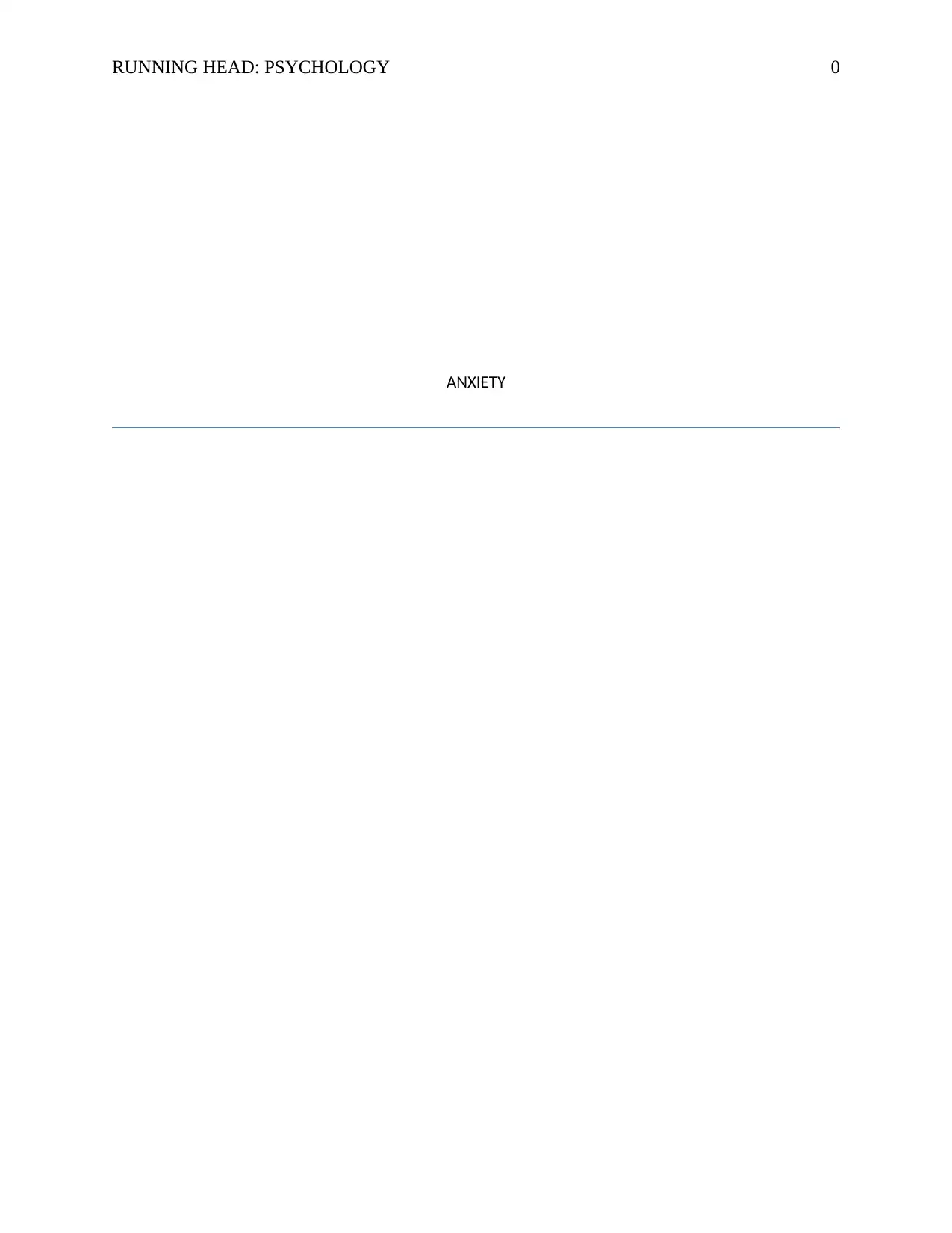
RUNNING HEAD: PSYCHOLOGY 0
ANXIETY
ANXIETY
Paraphrase This Document
Need a fresh take? Get an instant paraphrase of this document with our AI Paraphraser
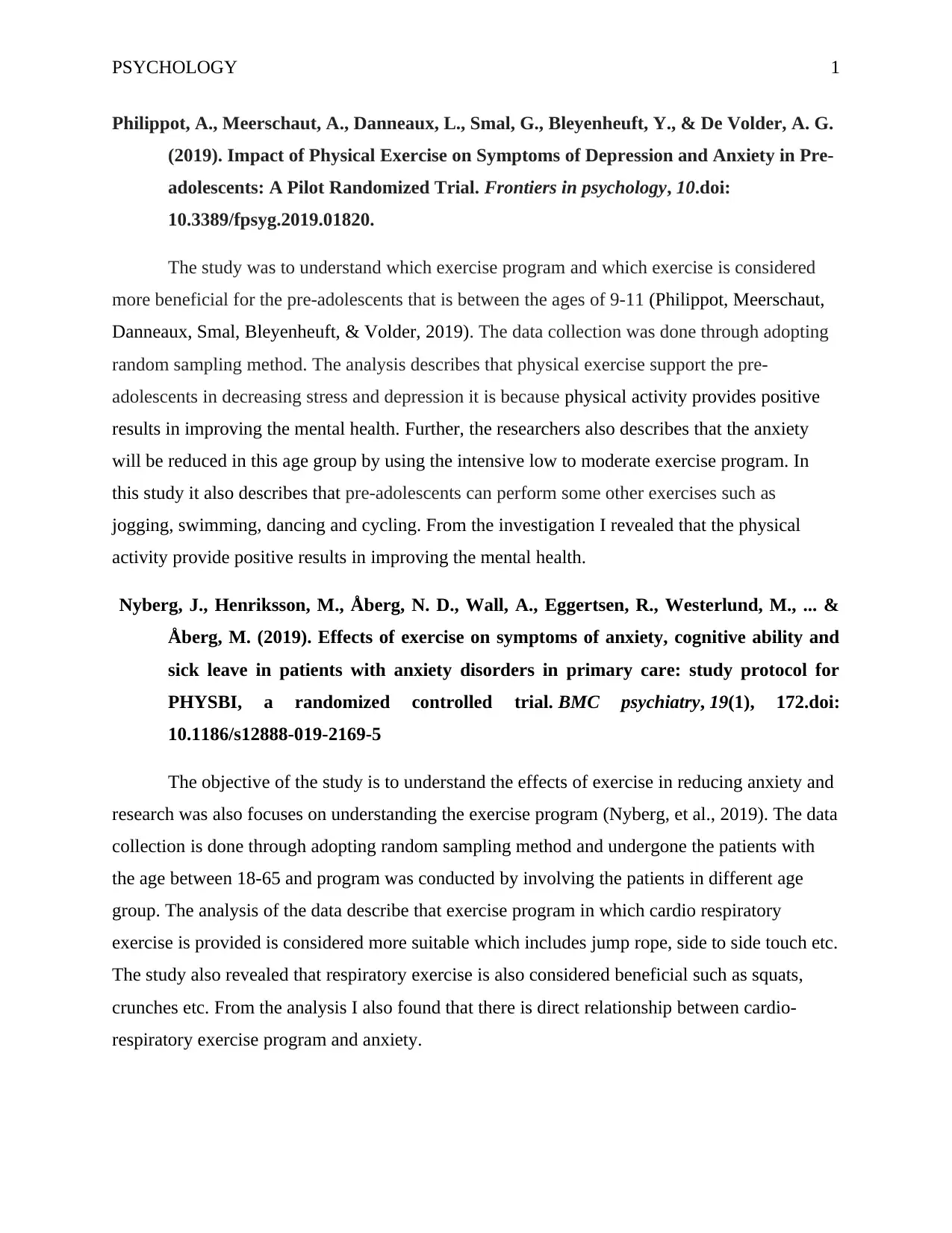
PSYCHOLOGY 1
Philippot, A., Meerschaut, A., Danneaux, L., Smal, G., Bleyenheuft, Y., & De Volder, A. G.
(2019). Impact of Physical Exercise on Symptoms of Depression and Anxiety in Pre-
adolescents: A Pilot Randomized Trial. Frontiers in psychology, 10.doi:
10.3389/fpsyg.2019.01820.
The study was to understand which exercise program and which exercise is considered
more beneficial for the pre-adolescents that is between the ages of 9-11 (Philippot, Meerschaut,
Danneaux, Smal, Bleyenheuft, & Volder, 2019). The data collection was done through adopting
random sampling method. The analysis describes that physical exercise support the pre-
adolescents in decreasing stress and depression it is because physical activity provides positive
results in improving the mental health. Further, the researchers also describes that the anxiety
will be reduced in this age group by using the intensive low to moderate exercise program. In
this study it also describes that pre-adolescents can perform some other exercises such as
jogging, swimming, dancing and cycling. From the investigation I revealed that the physical
activity provide positive results in improving the mental health.
Nyberg, J., Henriksson, M., Åberg, N. D., Wall, A., Eggertsen, R., Westerlund, M., ... &
Åberg, M. (2019). Effects of exercise on symptoms of anxiety, cognitive ability and
sick leave in patients with anxiety disorders in primary care: study protocol for
PHYSBI, a randomized controlled trial. BMC psychiatry, 19(1), 172.doi:
10.1186/s12888-019-2169-5
The objective of the study is to understand the effects of exercise in reducing anxiety and
research was also focuses on understanding the exercise program (Nyberg, et al., 2019). The data
collection is done through adopting random sampling method and undergone the patients with
the age between 18-65 and program was conducted by involving the patients in different age
group. The analysis of the data describe that exercise program in which cardio respiratory
exercise is provided is considered more suitable which includes jump rope, side to side touch etc.
The study also revealed that respiratory exercise is also considered beneficial such as squats,
crunches etc. From the analysis I also found that there is direct relationship between cardio-
respiratory exercise program and anxiety.
Philippot, A., Meerschaut, A., Danneaux, L., Smal, G., Bleyenheuft, Y., & De Volder, A. G.
(2019). Impact of Physical Exercise on Symptoms of Depression and Anxiety in Pre-
adolescents: A Pilot Randomized Trial. Frontiers in psychology, 10.doi:
10.3389/fpsyg.2019.01820.
The study was to understand which exercise program and which exercise is considered
more beneficial for the pre-adolescents that is between the ages of 9-11 (Philippot, Meerschaut,
Danneaux, Smal, Bleyenheuft, & Volder, 2019). The data collection was done through adopting
random sampling method. The analysis describes that physical exercise support the pre-
adolescents in decreasing stress and depression it is because physical activity provides positive
results in improving the mental health. Further, the researchers also describes that the anxiety
will be reduced in this age group by using the intensive low to moderate exercise program. In
this study it also describes that pre-adolescents can perform some other exercises such as
jogging, swimming, dancing and cycling. From the investigation I revealed that the physical
activity provide positive results in improving the mental health.
Nyberg, J., Henriksson, M., Åberg, N. D., Wall, A., Eggertsen, R., Westerlund, M., ... &
Åberg, M. (2019). Effects of exercise on symptoms of anxiety, cognitive ability and
sick leave in patients with anxiety disorders in primary care: study protocol for
PHYSBI, a randomized controlled trial. BMC psychiatry, 19(1), 172.doi:
10.1186/s12888-019-2169-5
The objective of the study is to understand the effects of exercise in reducing anxiety and
research was also focuses on understanding the exercise program (Nyberg, et al., 2019). The data
collection is done through adopting random sampling method and undergone the patients with
the age between 18-65 and program was conducted by involving the patients in different age
group. The analysis of the data describe that exercise program in which cardio respiratory
exercise is provided is considered more suitable which includes jump rope, side to side touch etc.
The study also revealed that respiratory exercise is also considered beneficial such as squats,
crunches etc. From the analysis I also found that there is direct relationship between cardio-
respiratory exercise program and anxiety.
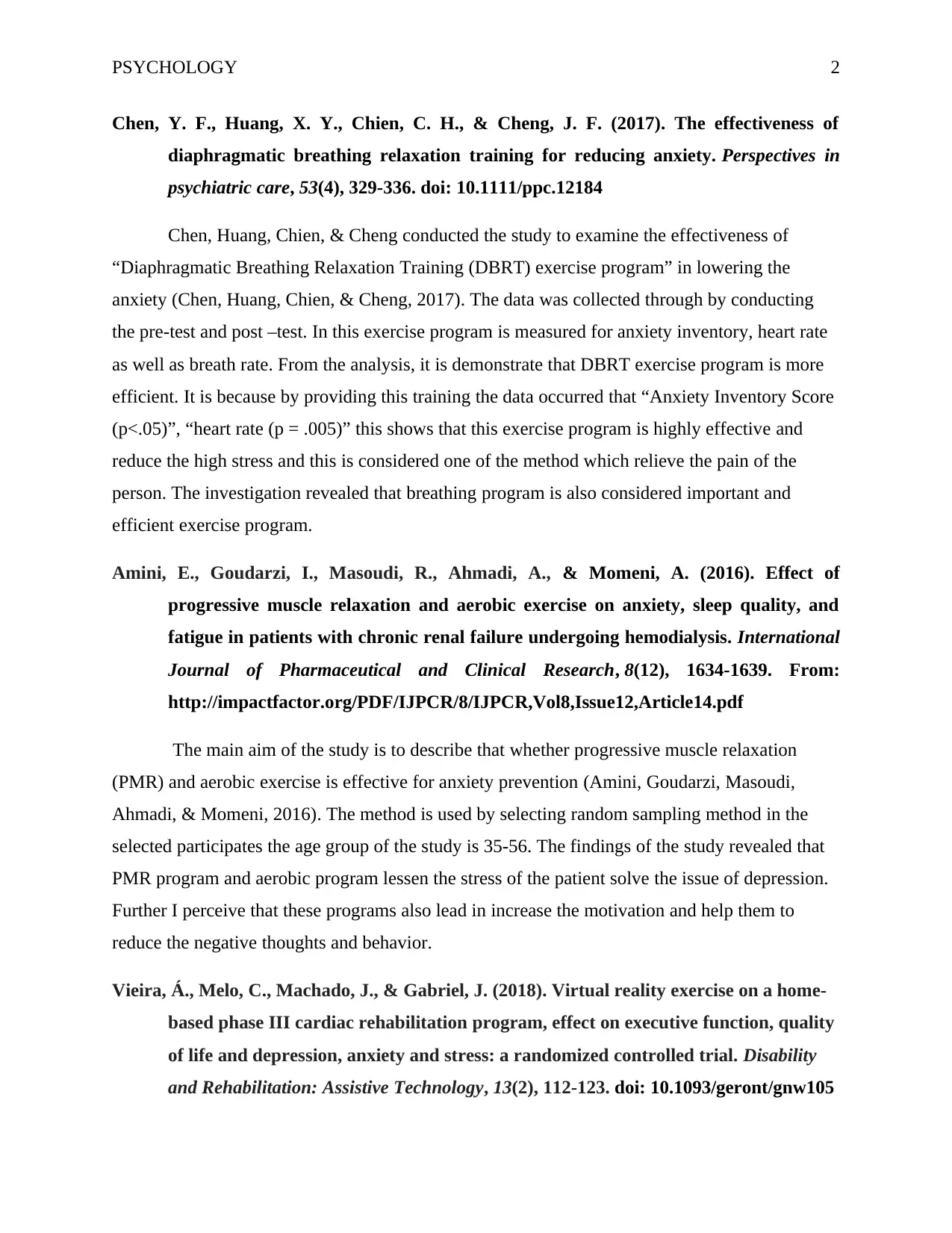
PSYCHOLOGY 2
Chen, Y. F., Huang, X. Y., Chien, C. H., & Cheng, J. F. (2017). The effectiveness of
diaphragmatic breathing relaxation training for reducing anxiety. Perspectives in
psychiatric care, 53(4), 329-336. doi: 10.1111/ppc.12184
Chen, Huang, Chien, & Cheng conducted the study to examine the effectiveness of
“Diaphragmatic Breathing Relaxation Training (DBRT) exercise program” in lowering the
anxiety (Chen, Huang, Chien, & Cheng, 2017). The data was collected through by conducting
the pre-test and post –test. In this exercise program is measured for anxiety inventory, heart rate
as well as breath rate. From the analysis, it is demonstrate that DBRT exercise program is more
efficient. It is because by providing this training the data occurred that “Anxiety Inventory Score
(p<.05)”, “heart rate (p = .005)” this shows that this exercise program is highly effective and
reduce the high stress and this is considered one of the method which relieve the pain of the
person. The investigation revealed that breathing program is also considered important and
efficient exercise program.
Amini, E., Goudarzi, I., Masoudi, R., Ahmadi, A., & Momeni, A. (2016). Effect of
progressive muscle relaxation and aerobic exercise on anxiety, sleep quality, and
fatigue in patients with chronic renal failure undergoing hemodialysis. International
Journal of Pharmaceutical and Clinical Research, 8(12), 1634-1639. From:
http://impactfactor.org/PDF/IJPCR/8/IJPCR,Vol8,Issue12,Article14.pdf
The main aim of the study is to describe that whether progressive muscle relaxation
(PMR) and aerobic exercise is effective for anxiety prevention (Amini, Goudarzi, Masoudi,
Ahmadi, & Momeni, 2016). The method is used by selecting random sampling method in the
selected participates the age group of the study is 35-56. The findings of the study revealed that
PMR program and aerobic program lessen the stress of the patient solve the issue of depression.
Further I perceive that these programs also lead in increase the motivation and help them to
reduce the negative thoughts and behavior.
Vieira, Á., Melo, C., Machado, J., & Gabriel, J. (2018). Virtual reality exercise on a home-
based phase III cardiac rehabilitation program, effect on executive function, quality
of life and depression, anxiety and stress: a randomized controlled trial. Disability
and Rehabilitation: Assistive Technology, 13(2), 112-123. doi: 10.1093/geront/gnw105
Chen, Y. F., Huang, X. Y., Chien, C. H., & Cheng, J. F. (2017). The effectiveness of
diaphragmatic breathing relaxation training for reducing anxiety. Perspectives in
psychiatric care, 53(4), 329-336. doi: 10.1111/ppc.12184
Chen, Huang, Chien, & Cheng conducted the study to examine the effectiveness of
“Diaphragmatic Breathing Relaxation Training (DBRT) exercise program” in lowering the
anxiety (Chen, Huang, Chien, & Cheng, 2017). The data was collected through by conducting
the pre-test and post –test. In this exercise program is measured for anxiety inventory, heart rate
as well as breath rate. From the analysis, it is demonstrate that DBRT exercise program is more
efficient. It is because by providing this training the data occurred that “Anxiety Inventory Score
(p<.05)”, “heart rate (p = .005)” this shows that this exercise program is highly effective and
reduce the high stress and this is considered one of the method which relieve the pain of the
person. The investigation revealed that breathing program is also considered important and
efficient exercise program.
Amini, E., Goudarzi, I., Masoudi, R., Ahmadi, A., & Momeni, A. (2016). Effect of
progressive muscle relaxation and aerobic exercise on anxiety, sleep quality, and
fatigue in patients with chronic renal failure undergoing hemodialysis. International
Journal of Pharmaceutical and Clinical Research, 8(12), 1634-1639. From:
http://impactfactor.org/PDF/IJPCR/8/IJPCR,Vol8,Issue12,Article14.pdf
The main aim of the study is to describe that whether progressive muscle relaxation
(PMR) and aerobic exercise is effective for anxiety prevention (Amini, Goudarzi, Masoudi,
Ahmadi, & Momeni, 2016). The method is used by selecting random sampling method in the
selected participates the age group of the study is 35-56. The findings of the study revealed that
PMR program and aerobic program lessen the stress of the patient solve the issue of depression.
Further I perceive that these programs also lead in increase the motivation and help them to
reduce the negative thoughts and behavior.
Vieira, Á., Melo, C., Machado, J., & Gabriel, J. (2018). Virtual reality exercise on a home-
based phase III cardiac rehabilitation program, effect on executive function, quality
of life and depression, anxiety and stress: a randomized controlled trial. Disability
and Rehabilitation: Assistive Technology, 13(2), 112-123. doi: 10.1093/geront/gnw105
⊘ This is a preview!⊘
Do you want full access?
Subscribe today to unlock all pages.

Trusted by 1+ million students worldwide
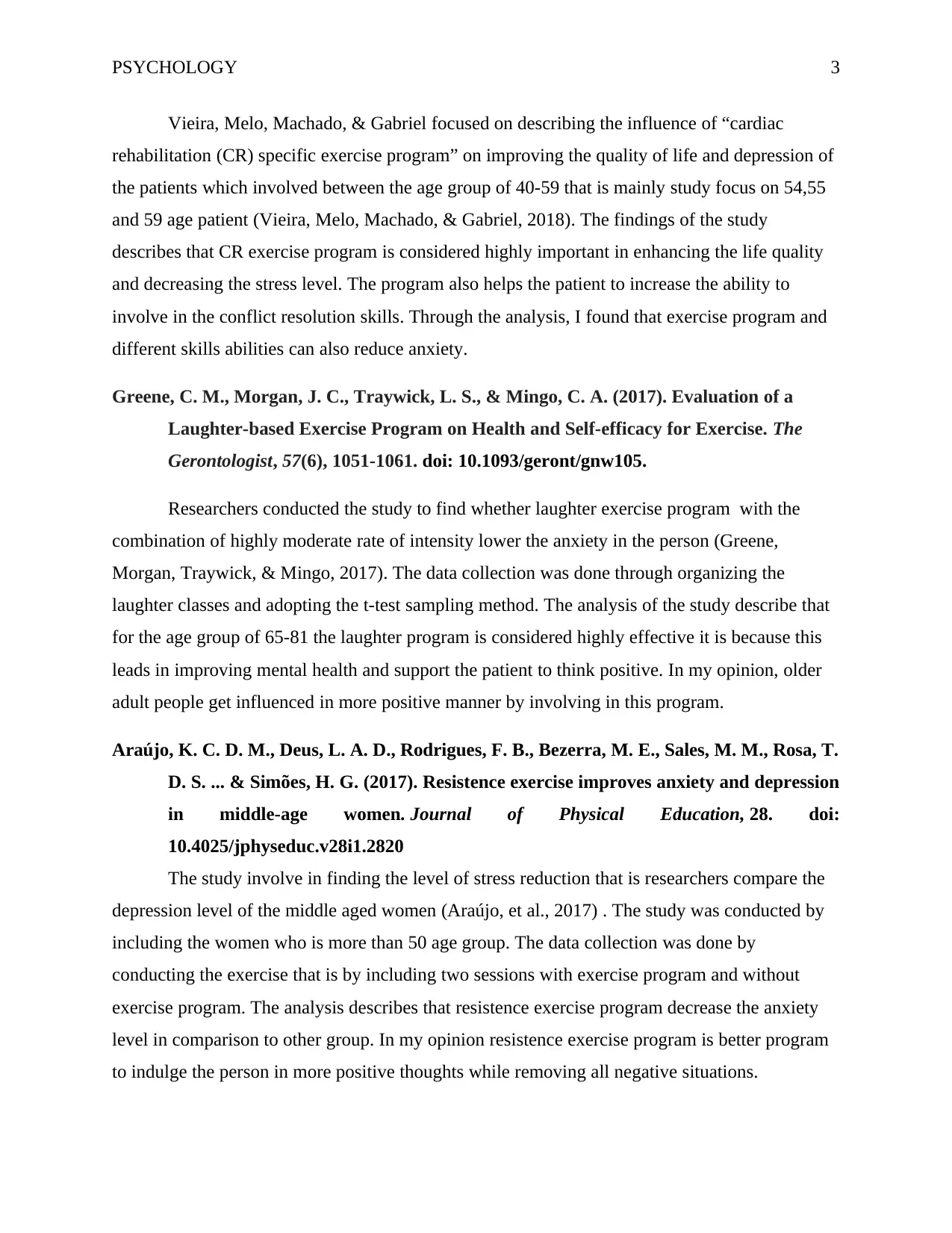
PSYCHOLOGY 3
Vieira, Melo, Machado, & Gabriel focused on describing the influence of “cardiac
rehabilitation (CR) specific exercise program” on improving the quality of life and depression of
the patients which involved between the age group of 40-59 that is mainly study focus on 54,55
and 59 age patient (Vieira, Melo, Machado, & Gabriel, 2018). The findings of the study
describes that CR exercise program is considered highly important in enhancing the life quality
and decreasing the stress level. The program also helps the patient to increase the ability to
involve in the conflict resolution skills. Through the analysis, I found that exercise program and
different skills abilities can also reduce anxiety.
Greene, C. M., Morgan, J. C., Traywick, L. S., & Mingo, C. A. (2017). Evaluation of a
Laughter-based Exercise Program on Health and Self-efficacy for Exercise. The
Gerontologist, 57(6), 1051-1061. doi: 10.1093/geront/gnw105.
Researchers conducted the study to find whether laughter exercise program with the
combination of highly moderate rate of intensity lower the anxiety in the person (Greene,
Morgan, Traywick, & Mingo, 2017). The data collection was done through organizing the
laughter classes and adopting the t-test sampling method. The analysis of the study describe that
for the age group of 65-81 the laughter program is considered highly effective it is because this
leads in improving mental health and support the patient to think positive. In my opinion, older
adult people get influenced in more positive manner by involving in this program.
Araújo, K. C. D. M., Deus, L. A. D., Rodrigues, F. B., Bezerra, M. E., Sales, M. M., Rosa, T.
D. S. ... & Simões, H. G. (2017). Resistence exercise improves anxiety and depression
in middle-age women. Journal of Physical Education, 28. doi:
10.4025/jphyseduc.v28i1.2820
The study involve in finding the level of stress reduction that is researchers compare the
depression level of the middle aged women (Araújo, et al., 2017) . The study was conducted by
including the women who is more than 50 age group. The data collection was done by
conducting the exercise that is by including two sessions with exercise program and without
exercise program. The analysis describes that resistence exercise program decrease the anxiety
level in comparison to other group. In my opinion resistence exercise program is better program
to indulge the person in more positive thoughts while removing all negative situations.
Vieira, Melo, Machado, & Gabriel focused on describing the influence of “cardiac
rehabilitation (CR) specific exercise program” on improving the quality of life and depression of
the patients which involved between the age group of 40-59 that is mainly study focus on 54,55
and 59 age patient (Vieira, Melo, Machado, & Gabriel, 2018). The findings of the study
describes that CR exercise program is considered highly important in enhancing the life quality
and decreasing the stress level. The program also helps the patient to increase the ability to
involve in the conflict resolution skills. Through the analysis, I found that exercise program and
different skills abilities can also reduce anxiety.
Greene, C. M., Morgan, J. C., Traywick, L. S., & Mingo, C. A. (2017). Evaluation of a
Laughter-based Exercise Program on Health and Self-efficacy for Exercise. The
Gerontologist, 57(6), 1051-1061. doi: 10.1093/geront/gnw105.
Researchers conducted the study to find whether laughter exercise program with the
combination of highly moderate rate of intensity lower the anxiety in the person (Greene,
Morgan, Traywick, & Mingo, 2017). The data collection was done through organizing the
laughter classes and adopting the t-test sampling method. The analysis of the study describe that
for the age group of 65-81 the laughter program is considered highly effective it is because this
leads in improving mental health and support the patient to think positive. In my opinion, older
adult people get influenced in more positive manner by involving in this program.
Araújo, K. C. D. M., Deus, L. A. D., Rodrigues, F. B., Bezerra, M. E., Sales, M. M., Rosa, T.
D. S. ... & Simões, H. G. (2017). Resistence exercise improves anxiety and depression
in middle-age women. Journal of Physical Education, 28. doi:
10.4025/jphyseduc.v28i1.2820
The study involve in finding the level of stress reduction that is researchers compare the
depression level of the middle aged women (Araújo, et al., 2017) . The study was conducted by
including the women who is more than 50 age group. The data collection was done by
conducting the exercise that is by including two sessions with exercise program and without
exercise program. The analysis describes that resistence exercise program decrease the anxiety
level in comparison to other group. In my opinion resistence exercise program is better program
to indulge the person in more positive thoughts while removing all negative situations.
Paraphrase This Document
Need a fresh take? Get an instant paraphrase of this document with our AI Paraphraser
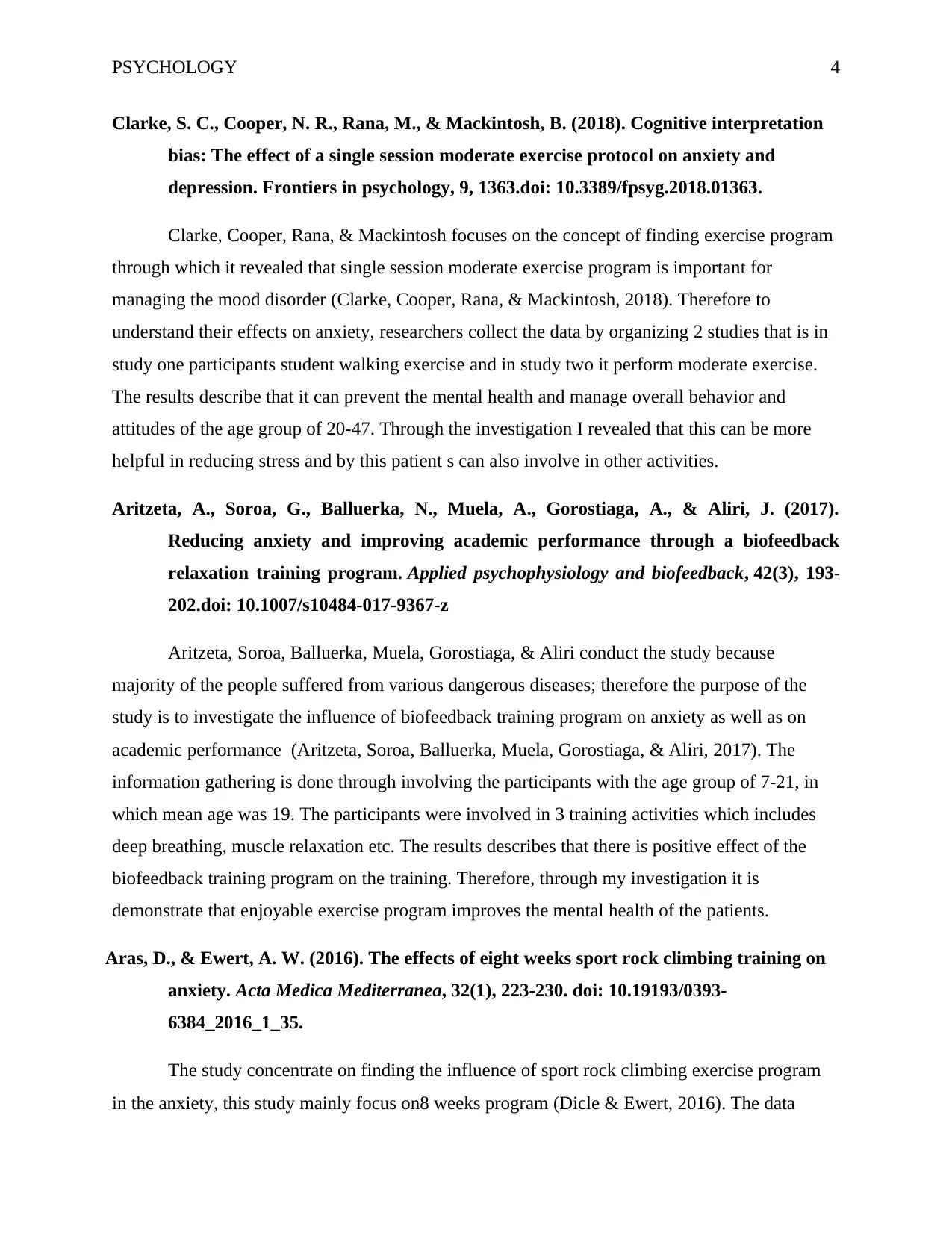
PSYCHOLOGY 4
Clarke, S. C., Cooper, N. R., Rana, M., & Mackintosh, B. (2018). Cognitive interpretation
bias: The effect of a single session moderate exercise protocol on anxiety and
depression. Frontiers in psychology, 9, 1363.doi: 10.3389/fpsyg.2018.01363.
Clarke, Cooper, Rana, & Mackintosh focuses on the concept of finding exercise program
through which it revealed that single session moderate exercise program is important for
managing the mood disorder (Clarke, Cooper, Rana, & Mackintosh, 2018). Therefore to
understand their effects on anxiety, researchers collect the data by organizing 2 studies that is in
study one participants student walking exercise and in study two it perform moderate exercise.
The results describe that it can prevent the mental health and manage overall behavior and
attitudes of the age group of 20-47. Through the investigation I revealed that this can be more
helpful in reducing stress and by this patient s can also involve in other activities.
Aritzeta, A., Soroa, G., Balluerka, N., Muela, A., Gorostiaga, A., & Aliri, J. (2017).
Reducing anxiety and improving academic performance through a biofeedback
relaxation training program. Applied psychophysiology and biofeedback, 42(3), 193-
202.doi: 10.1007/s10484-017-9367-z
Aritzeta, Soroa, Balluerka, Muela, Gorostiaga, & Aliri conduct the study because
majority of the people suffered from various dangerous diseases; therefore the purpose of the
study is to investigate the influence of biofeedback training program on anxiety as well as on
academic performance (Aritzeta, Soroa, Balluerka, Muela, Gorostiaga, & Aliri, 2017). The
information gathering is done through involving the participants with the age group of 7-21, in
which mean age was 19. The participants were involved in 3 training activities which includes
deep breathing, muscle relaxation etc. The results describes that there is positive effect of the
biofeedback training program on the training. Therefore, through my investigation it is
demonstrate that enjoyable exercise program improves the mental health of the patients.
Aras, D., & Ewert, A. W. (2016). The effects of eight weeks sport rock climbing training on
anxiety. Acta Medica Mediterranea, 32(1), 223-230. doi: 10.19193/0393-
6384_2016_1_35.
The study concentrate on finding the influence of sport rock climbing exercise program
in the anxiety, this study mainly focus on8 weeks program (Dicle & Ewert, 2016). The data
Clarke, S. C., Cooper, N. R., Rana, M., & Mackintosh, B. (2018). Cognitive interpretation
bias: The effect of a single session moderate exercise protocol on anxiety and
depression. Frontiers in psychology, 9, 1363.doi: 10.3389/fpsyg.2018.01363.
Clarke, Cooper, Rana, & Mackintosh focuses on the concept of finding exercise program
through which it revealed that single session moderate exercise program is important for
managing the mood disorder (Clarke, Cooper, Rana, & Mackintosh, 2018). Therefore to
understand their effects on anxiety, researchers collect the data by organizing 2 studies that is in
study one participants student walking exercise and in study two it perform moderate exercise.
The results describe that it can prevent the mental health and manage overall behavior and
attitudes of the age group of 20-47. Through the investigation I revealed that this can be more
helpful in reducing stress and by this patient s can also involve in other activities.
Aritzeta, A., Soroa, G., Balluerka, N., Muela, A., Gorostiaga, A., & Aliri, J. (2017).
Reducing anxiety and improving academic performance through a biofeedback
relaxation training program. Applied psychophysiology and biofeedback, 42(3), 193-
202.doi: 10.1007/s10484-017-9367-z
Aritzeta, Soroa, Balluerka, Muela, Gorostiaga, & Aliri conduct the study because
majority of the people suffered from various dangerous diseases; therefore the purpose of the
study is to investigate the influence of biofeedback training program on anxiety as well as on
academic performance (Aritzeta, Soroa, Balluerka, Muela, Gorostiaga, & Aliri, 2017). The
information gathering is done through involving the participants with the age group of 7-21, in
which mean age was 19. The participants were involved in 3 training activities which includes
deep breathing, muscle relaxation etc. The results describes that there is positive effect of the
biofeedback training program on the training. Therefore, through my investigation it is
demonstrate that enjoyable exercise program improves the mental health of the patients.
Aras, D., & Ewert, A. W. (2016). The effects of eight weeks sport rock climbing training on
anxiety. Acta Medica Mediterranea, 32(1), 223-230. doi: 10.19193/0393-
6384_2016_1_35.
The study concentrate on finding the influence of sport rock climbing exercise program
in the anxiety, this study mainly focus on8 weeks program (Dicle & Ewert, 2016). The data
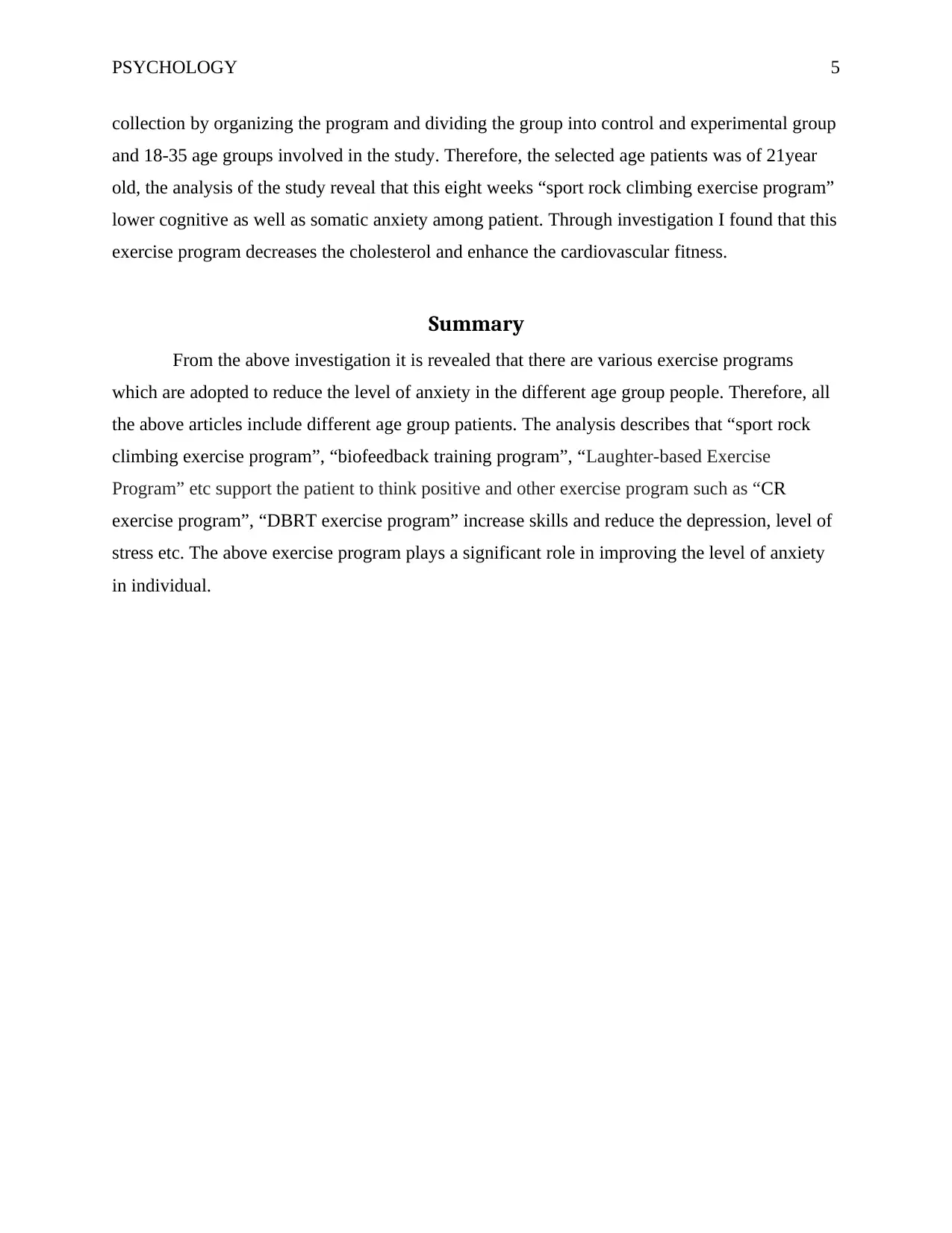
PSYCHOLOGY 5
collection by organizing the program and dividing the group into control and experimental group
and 18-35 age groups involved in the study. Therefore, the selected age patients was of 21year
old, the analysis of the study reveal that this eight weeks “sport rock climbing exercise program”
lower cognitive as well as somatic anxiety among patient. Through investigation I found that this
exercise program decreases the cholesterol and enhance the cardiovascular fitness.
Summary
From the above investigation it is revealed that there are various exercise programs
which are adopted to reduce the level of anxiety in the different age group people. Therefore, all
the above articles include different age group patients. The analysis describes that “sport rock
climbing exercise program”, “biofeedback training program”, “Laughter-based Exercise
Program” etc support the patient to think positive and other exercise program such as “CR
exercise program”, “DBRT exercise program” increase skills and reduce the depression, level of
stress etc. The above exercise program plays a significant role in improving the level of anxiety
in individual.
collection by organizing the program and dividing the group into control and experimental group
and 18-35 age groups involved in the study. Therefore, the selected age patients was of 21year
old, the analysis of the study reveal that this eight weeks “sport rock climbing exercise program”
lower cognitive as well as somatic anxiety among patient. Through investigation I found that this
exercise program decreases the cholesterol and enhance the cardiovascular fitness.
Summary
From the above investigation it is revealed that there are various exercise programs
which are adopted to reduce the level of anxiety in the different age group people. Therefore, all
the above articles include different age group patients. The analysis describes that “sport rock
climbing exercise program”, “biofeedback training program”, “Laughter-based Exercise
Program” etc support the patient to think positive and other exercise program such as “CR
exercise program”, “DBRT exercise program” increase skills and reduce the depression, level of
stress etc. The above exercise program plays a significant role in improving the level of anxiety
in individual.
⊘ This is a preview!⊘
Do you want full access?
Subscribe today to unlock all pages.

Trusted by 1+ million students worldwide
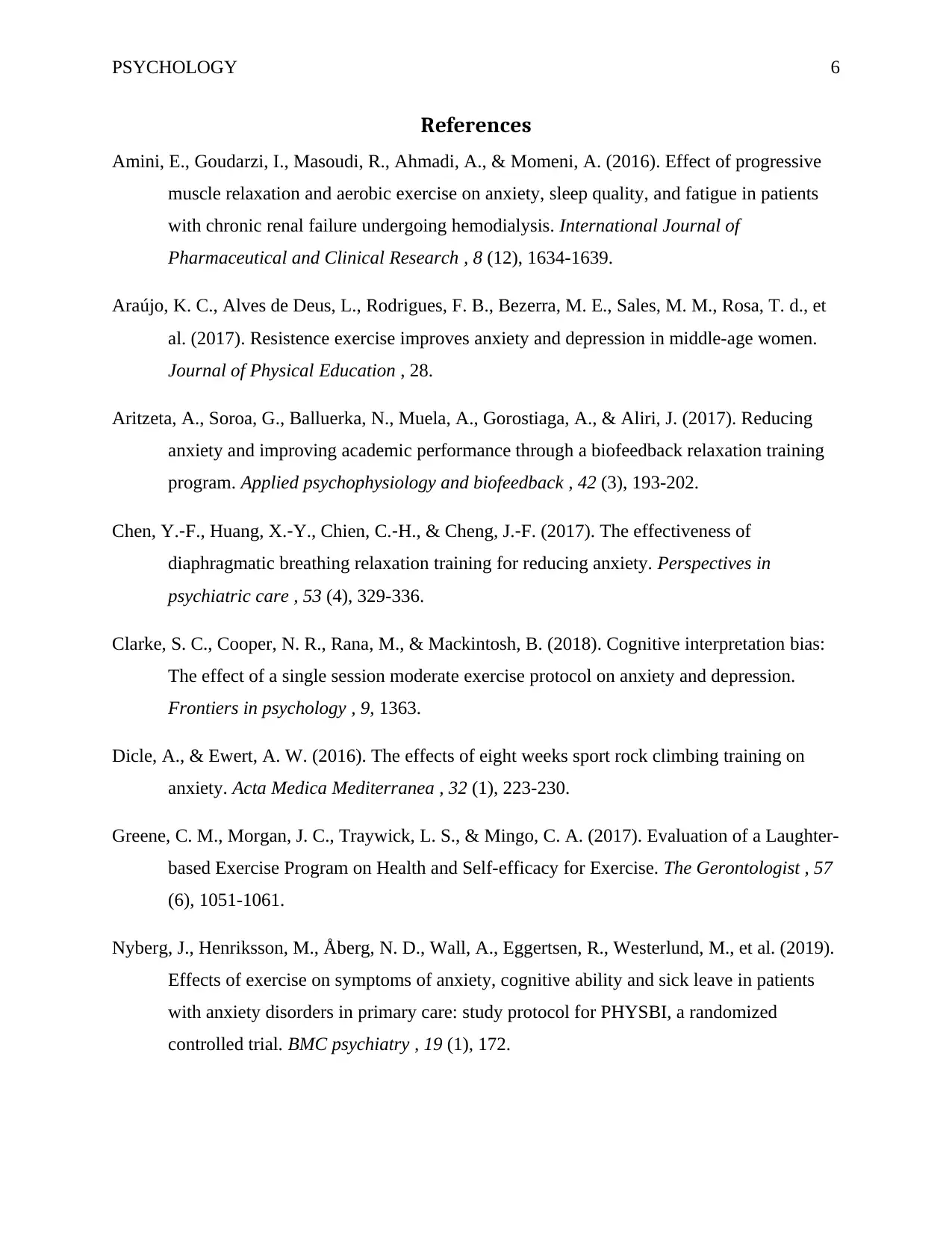
PSYCHOLOGY 6
References
Amini, E., Goudarzi, I., Masoudi, R., Ahmadi, A., & Momeni, A. (2016). Effect of progressive
muscle relaxation and aerobic exercise on anxiety, sleep quality, and fatigue in patients
with chronic renal failure undergoing hemodialysis. International Journal of
Pharmaceutical and Clinical Research , 8 (12), 1634-1639.
Araújo, K. C., Alves de Deus, L., Rodrigues, F. B., Bezerra, M. E., Sales, M. M., Rosa, T. d., et
al. (2017). Resistence exercise improves anxiety and depression in middle-age women.
Journal of Physical Education , 28.
Aritzeta, A., Soroa, G., Balluerka, N., Muela, A., Gorostiaga, A., & Aliri, J. (2017). Reducing
anxiety and improving academic performance through a biofeedback relaxation training
program. Applied psychophysiology and biofeedback , 42 (3), 193-202.
Chen, Y.‐F., Huang, X.‐Y., Chien, C.‐H., & Cheng, J.‐F. (2017). The effectiveness of
diaphragmatic breathing relaxation training for reducing anxiety. Perspectives in
psychiatric care , 53 (4), 329-336.
Clarke, S. C., Cooper, N. R., Rana, M., & Mackintosh, B. (2018). Cognitive interpretation bias:
The effect of a single session moderate exercise protocol on anxiety and depression.
Frontiers in psychology , 9, 1363.
Dicle, A., & Ewert, A. W. (2016). The effects of eight weeks sport rock climbing training on
anxiety. Acta Medica Mediterranea , 32 (1), 223-230.
Greene, C. M., Morgan, J. C., Traywick, L. S., & Mingo, C. A. (2017). Evaluation of a Laughter-
based Exercise Program on Health and Self-efficacy for Exercise. The Gerontologist , 57
(6), 1051-1061.
Nyberg, J., Henriksson, M., Åberg, N. D., Wall, A., Eggertsen, R., Westerlund, M., et al. (2019).
Effects of exercise on symptoms of anxiety, cognitive ability and sick leave in patients
with anxiety disorders in primary care: study protocol for PHYSBI, a randomized
controlled trial. BMC psychiatry , 19 (1), 172.
References
Amini, E., Goudarzi, I., Masoudi, R., Ahmadi, A., & Momeni, A. (2016). Effect of progressive
muscle relaxation and aerobic exercise on anxiety, sleep quality, and fatigue in patients
with chronic renal failure undergoing hemodialysis. International Journal of
Pharmaceutical and Clinical Research , 8 (12), 1634-1639.
Araújo, K. C., Alves de Deus, L., Rodrigues, F. B., Bezerra, M. E., Sales, M. M., Rosa, T. d., et
al. (2017). Resistence exercise improves anxiety and depression in middle-age women.
Journal of Physical Education , 28.
Aritzeta, A., Soroa, G., Balluerka, N., Muela, A., Gorostiaga, A., & Aliri, J. (2017). Reducing
anxiety and improving academic performance through a biofeedback relaxation training
program. Applied psychophysiology and biofeedback , 42 (3), 193-202.
Chen, Y.‐F., Huang, X.‐Y., Chien, C.‐H., & Cheng, J.‐F. (2017). The effectiveness of
diaphragmatic breathing relaxation training for reducing anxiety. Perspectives in
psychiatric care , 53 (4), 329-336.
Clarke, S. C., Cooper, N. R., Rana, M., & Mackintosh, B. (2018). Cognitive interpretation bias:
The effect of a single session moderate exercise protocol on anxiety and depression.
Frontiers in psychology , 9, 1363.
Dicle, A., & Ewert, A. W. (2016). The effects of eight weeks sport rock climbing training on
anxiety. Acta Medica Mediterranea , 32 (1), 223-230.
Greene, C. M., Morgan, J. C., Traywick, L. S., & Mingo, C. A. (2017). Evaluation of a Laughter-
based Exercise Program on Health and Self-efficacy for Exercise. The Gerontologist , 57
(6), 1051-1061.
Nyberg, J., Henriksson, M., Åberg, N. D., Wall, A., Eggertsen, R., Westerlund, M., et al. (2019).
Effects of exercise on symptoms of anxiety, cognitive ability and sick leave in patients
with anxiety disorders in primary care: study protocol for PHYSBI, a randomized
controlled trial. BMC psychiatry , 19 (1), 172.
Paraphrase This Document
Need a fresh take? Get an instant paraphrase of this document with our AI Paraphraser
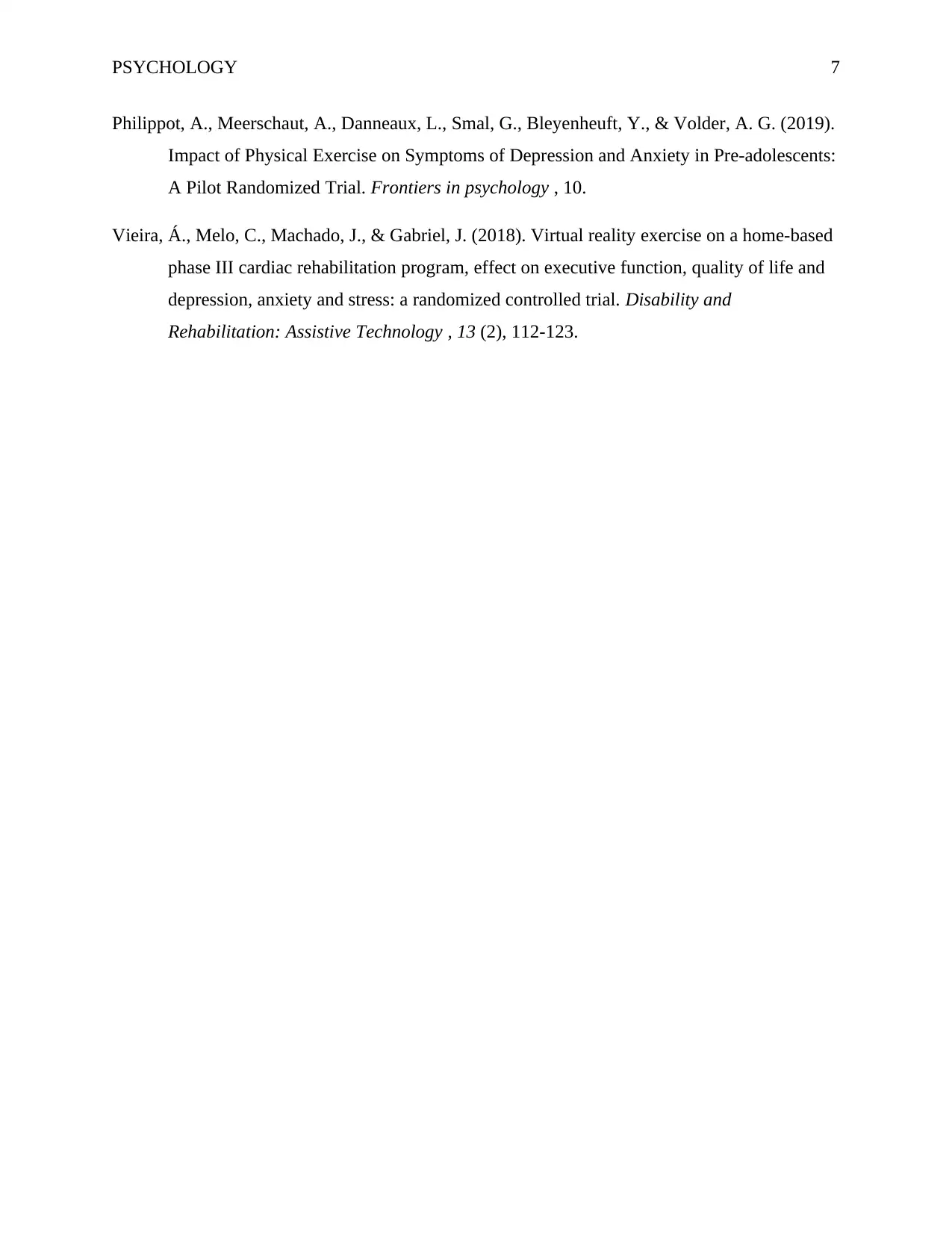
PSYCHOLOGY 7
Philippot, A., Meerschaut, A., Danneaux, L., Smal, G., Bleyenheuft, Y., & Volder, A. G. (2019).
Impact of Physical Exercise on Symptoms of Depression and Anxiety in Pre-adolescents:
A Pilot Randomized Trial. Frontiers in psychology , 10.
Vieira, Á., Melo, C., Machado, J., & Gabriel, J. (2018). Virtual reality exercise on a home-based
phase III cardiac rehabilitation program, effect on executive function, quality of life and
depression, anxiety and stress: a randomized controlled trial. Disability and
Rehabilitation: Assistive Technology , 13 (2), 112-123.
Philippot, A., Meerschaut, A., Danneaux, L., Smal, G., Bleyenheuft, Y., & Volder, A. G. (2019).
Impact of Physical Exercise on Symptoms of Depression and Anxiety in Pre-adolescents:
A Pilot Randomized Trial. Frontiers in psychology , 10.
Vieira, Á., Melo, C., Machado, J., & Gabriel, J. (2018). Virtual reality exercise on a home-based
phase III cardiac rehabilitation program, effect on executive function, quality of life and
depression, anxiety and stress: a randomized controlled trial. Disability and
Rehabilitation: Assistive Technology , 13 (2), 112-123.
1 out of 8
Your All-in-One AI-Powered Toolkit for Academic Success.
+13062052269
info@desklib.com
Available 24*7 on WhatsApp / Email
![[object Object]](/_next/static/media/star-bottom.7253800d.svg)
Unlock your academic potential
Copyright © 2020–2026 A2Z Services. All Rights Reserved. Developed and managed by ZUCOL.